
USA & CANADA (901)
Latest News
Hallmark Hosts Mountain Plains Minority Supplier Development Council Town Hall Meeting in Kansas City.
Monday, 12 February 2018 01:53 Written by OASESNEWSMBDA is a Federal Agency created specifically to foster the establishment and growth of minority-owned businesses in America. Remarkably, assisting Minority Business Enterprise (MBEs) in the areas of financing, planning, management, marketing and also obtaining Government and Corporate contracting opportunities.
The MBDA Business Center in Denver serves minority-owned firms seeking: new contracting opportunities, a variety of financial services, new market penetration options, and/ or growth in size and scale. In a recent Townhall meeting in Kansas City, held under the auspices of Hallmark Visitor’s Center; their experienced staff and extensive network of strategic partners gave Kansas City clients better abilities to secure capital (new or finance), compete for contracts, and provide employment opportunities.
The Town Hall meeting attracted firms across Midwest geographic hubs of the Mountain Plains MSDC. Where stakeholders, new entrants shared ideas and engaged in meaningful dialogued about how best the Mountain Plains MSDC better offers to serve minority business/supplier development needs. Interestingly, forums were opened to all corporate members and certified MBEs.
The Town Hall meeting attracted firms across Midwest geographic hubs of the Mountain Plains MSDC. Where stakeholders, new entrants shared ideas and engaged in meaningful dialogued about how best the Mountain Plains MSDC better offers to serve minority business/supplier development needs. Interestingly, forums were opened to all corporate members and certified MBEs.
After the two hours interactive, well attended facilitated Town Hall, Hallmark treated participants to a world-class refreshment with professional complimentary services at every table, while networking progressed smoothly.
Belinda Hooks - Market President - CO/NE and Elizabeth Hill - MBE Services and Development Manager, were seen to add colors to the Town Hall.
Mountain Plains MSDC closed meeting with few words and very meaningful statement, “we appreciate the participation and engagement of those that attended these events. We value your continued support.”
Trump Urges Congress To End U.S. Visa Lottery
Sunday, 11 February 2018 21:53 Written by oasesnews U.S. President, Donald Trump, has called on Congress to end the visa lottery programme, citing a Justice Department crackdown on a recipient who abused resident status to finance terrorist activities abroad.
“Time to end the visa lottery,” Trump said in a Twitter post.
He added: “Congress must secure the immigration system and protect Americans.”
Trump linked his message to a Justice Department press release regarding a complaint to revoke the resident status of a visa lottery program recipient who funded global terrorist activities.
The Justice Department’s complaint said a Sudanese national who gained lawful permanent resident status through the “diversity visa lottery program” ran a non-profit organisation, the Islamic American Relief Agency, and through it funneled money to known terrorist organisations in Iraq and elsewhere.
Earlier, report revealed that US immigration enforcement arrests shut up 20 per cent in 2017 versus the previous year.
The report also said that former President Barack Obama’s immigration policy was more narrowly focused on arresting undocumented immigrants convicted of serious crimes.
Why Justin Trudeau is not the leader many believe he is
Wednesday, 07 February 2018 00:38 Written by theconversationStephen Harper, Canada’s former prime minister, might well have been less colourful and pleasing to eye and ear than the current Canadian leader.
But Harper focused on what he believed Canada needed to get ahead in the world, not on his image and on making Canadians feel good about themselves. This contrasts markedly with the approach under Prime Minister Justin Trudeau.
How much longer will Canada have to pay the price so Trudeau can remind us that he is a human rights activist?
Take, for example, the inquiry into violence against Indigenous women and girls, and the flow of refugees and asylum seekers coming to Canada.
One of the most sensitive issues during Canada’s 2015 federal election was the debate about creating an inquiry into missing and murdered Indigenous women and girls. Harper resisted creating one, despite years of urging by Indigenous communities, the United Nations and human rights groups. Trudeau committed to launching a national inquiryduring the political campaign.
Canadians finally believed this issue would be addressed, and there was new hope for reconciliation. Trudeau promised a “total renewal” of Canada’s relationship with Indigenous communities. Carolyn Bennett was named Minister of Indigenous and Northern Affairs, and assigned to the National Inquiry into Missing and Murdered Indigenous Women and Girls.
But Bennett, the so-called minister of reconciliation, has proven unable to make much progress on the inquiry.
It languishes to this day, money wasted, mired in recrimination and hostility. Expectations dashed, some from Indigenous communities say they have been failed once again.
In a recent cabinet shuffle, Trudeau split Bennett’s ministerial portfolio, a reflection of her performance in a hard job, but she remains lead minister for the inquiry. Expectations remain low.
Polished, poised
Harper lost the 2015 election for several reasons – he’d spent a long time in power, there was a charismatic new opposition leader on the scene, and he seemed to lack patience any longer to provide the morally superior rhetoric that Canadians love. This nationalistic self-praise, proclaiming Canadians’ virtue over and above all other countries, is what Canadian scholar Kim Richard Nossal aptly termed “ear candy.”
Not Trudeau. Polished and poised, he always says the “right” thing. If Trudeau’s Canada is famous for anything in the world, it is for setting a good example to other countries.
Trudeau implemented his election campaign promise to allow 25,000 Syrian refugeesexpedited entry to Canada. And when U.S. President Donald Trump moved in January 2017 to ban travellers from targeted Muslim-majority countries, Trudeau sent a tweet depicting Canada as a tolerant haven, and emphasized its welcoming, open borders.
To those fleeing persecution, terror & war, Canadians will welcome you, regardless of your faith. Diversity is our strength #WelcomeToCanada
However, Trudeau’s tweet created a huge problem.
When thousands of Haitian asylum-seekers, afraid Trump might end their temporary protected status that allows them to remain in the U.S., illegally crossed the border into Québec, the Trudeau government started singing a different tune. In July and August 2017, 250 people a day crossed the border, many of them Haitians. Ministers rushed to explain there was no open invitation: There are rules that must be adhered to, and claiming asylum is not a free ticket into Canada.
Tent camps for the initial refugee processing have been set up along the Canada-U.S. border. And more people may come. Canadian officials are gearing up for an influx of migrants heading north in the coming months. Cancellation of protected status for the 50,000 Haitians in the U.S. has been confirmed by the Trump administration, effective July 2019. It’s also announced that protected status for the nearly 200,000 Salvadorians living in the U.S. won’t be renewed either.
There’s little doubt those migrants are eyeing Canada.
But Canada is not prepared to accept everyone, despite Trudeau’s tweet. It ushered in the 25,000 Syrians shortly after his election, but after that it was back to business as usual, regardless that the scale of need was in the millions.
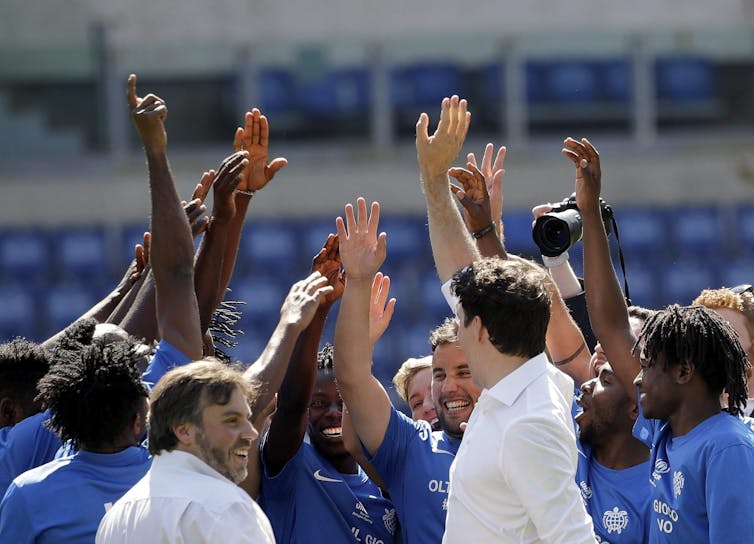
Prime Minister Justin Trudeau coaches a youth soccer team formed by migrants and refugees at the Roma Soccer Club Stadium in Rome in May 2017 while he was in Italy for a G7 summit. (The Canadian Press/Sean Kilpatrick)
Far away from the world’s war zones, Canada has always been able to roll out the welcome mat when it wanted. That’s why closer to home, the asylum issue with the U.S. is causing serious concerns for the Trudeau government — it exposes the difference between the nationalist self-congratulation that the prime minister trades in, and what Canadians are willing to accept in practice.
Many countries aren’t so lucky. Consider, by comparison, the refugee situation for Germany as it existed in 2015. Some days, more than 10,000 Syrian refugees arrived in Germany. Almost 20,000 arrived in one weekend, 10,000 in Munich alone.
Canada has not had to cope with such numbers. What’s more, Canada is tough on those lucky enough to arrive here. Since 2000, at least 16 people have died in Canada’s system of immigration detention centres.
And yet Trudeau continues to burnish his personal political image and to poke Canada’s greatest ally in the eye — most recently in Davos.
A Trump snub?
France’s Emmanuel Macron and China’s Xi Jinping have mounted apparently successful charm offensives to advance key priorities with Trump. Not Canada’s leader. Trudeau did not bother to meet Trump at the recent Davos World Economic Forum so that, he said, other leaders could have a chance.
Some have pointed to Trudeau’s apparent charm offensive with Ivanka Trump as clever and strategic. In addition to working with the president’s daughter on issues facing women in the workplace, he attended the Canadian Broadway play, Come From Away, with her in March 2017. But the play itself was about Canadian inclusiveness and support for foreigners in need, not-so-subtly underscoring Trudeau’s criticism of Trump’s public policy. Is this a winning strategy?
For Trudeau, everything seems to be about glorifying Canada, and himself by extension. That’s not always in the best interests of Canada, but it is what Canada gets in abundance from its current prime minister. Harper, despite his private reservations about former president Barack Obama, never publicly threw shade at his fellow leader.
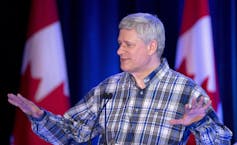
Former prime minister Stephen Harper speaks at a barbecue in Calgary in July 2015. THE CANADIAN PRESS/Larry MacDougal
Harper was less popular than Trudeau, but Canadians could count on him for one thing — not making his personal image on the global stage a top priority. What Trudeau says obviously appeals to Canadians. But do his actions back up his words? On Indigenous issues, on immigration, on welcoming refugees, the answer is no. Whether Canadians agreed or disagreed with Harper, his actions matched his words.
Trudeau almost has it all. He’s got that famous name. He’s got the central casting looks. He’s got the top job in Canada. The one thing he needs is for Canada and the world to regard him as human rights activist, because even when it disadvantages the national interest, that’s seemingly less important than his own personal interests — a far cry from Canada’s previous prime minister.
Author: Grant Dawson: Assistant Professor of Social Science and International Politics, University of Nottingham
Credit link: https://theconversation.com/why-justin-trudeau-is-not-the-leader-many-believe-he-is-90796<img src="https://counter.theconversation.com/content/90796/count.gif?distributor=republish-lightbox-advanced" alt="The Conversation" width="1" height="1" />
The article was first published by The Conversation (http://www.theconversation.com) and is republished with permission granted to www.oasesnews.com
U.S replies Russia, says we can never be friends
Friday, 02 February 2018 16:54 Written by informationng.com
Popular News
Dealing with weed in the workplace
Monday, 29 January 2018 00:34 Written by theconversationWhen marijuana is legal later this year in Canada, many Canadians may consider smoking weed on their way to work, or stepping out to purchase it during their coffee break.
How will this impact workplace productivity, and health and safety — especially in occupations involving driving or operating heavy machinery?
The federal government’s commitment to legalize recreational marijuana by July 1, 2018raises occupational health and safety concerns for many employers.
At the Institute for Work & Health (IWH), we have been reviewing the effects of various drugs that act on the central nervous system — including marijuana — on workplace injuries, deaths and near-misses.
What is striking is how little high-quality evidence there is on the impacts of marijuana in the workplace and how inconsistent the existing data is.
We urgently need high-quality observational research studies to be able to better understand the effects of marijuana on work. We also need to develop an accurate measure of impairment for use in Canadian workplaces.
No published studies on legalization
As far as we’re aware, no published studies to date have examined the impact of recreational marijuana legalization on the workplace.
The only data we’ve seen is from a report released in 2017 by a large private drug-testing company in the United States. It found that the rates of positive cannabis tests in Washington and Colorado in 2016 outpaced the national average for the first time since the two states legalized cannabis in 2012.
But these rates were based on the number of tests conducted, so it’s not clear whether this reflects an increase in the number of employees testing positive.
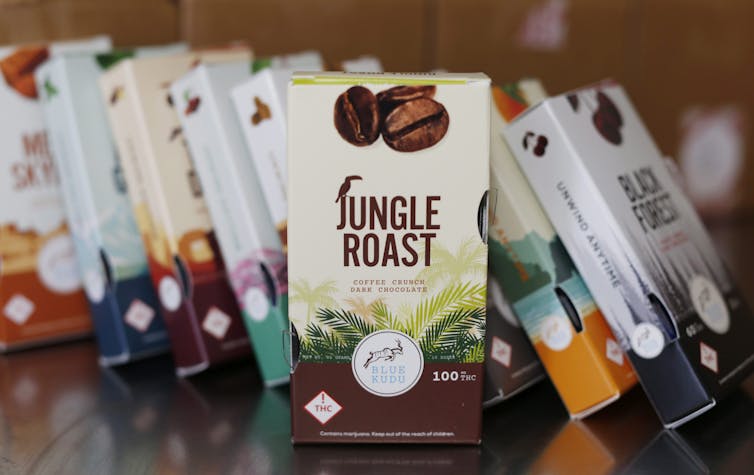
Workplace injuries and accidents
Several studies have examined the impact of marijuana use on workplace outcomes, but with mixed results.
Some have found associations between marijuana use in the workforce and work absenteeism, reduced productivity, job turnover, disciplinary measures, workplace accidents and injuries, unemployment and interpersonal conflict.
However, other studies have found no association with some of these outcomes. Overall, the evidence to date is quite inconsistent.
In 2017, the U.S. National Academy of Sciences published a major report on the health effects of marijuana use, including impacts on injuries and accidents in a workplace setting.
Based on six studies, the review did not find enough evidence to either support or refute a statistical link between marijuana use and occupational injuries or accidents.
No indicator for acute impairment
Some of the inconsistency in the research that does exist may be due to differences in study design and methodologies and difficulties in conducting this type of research.
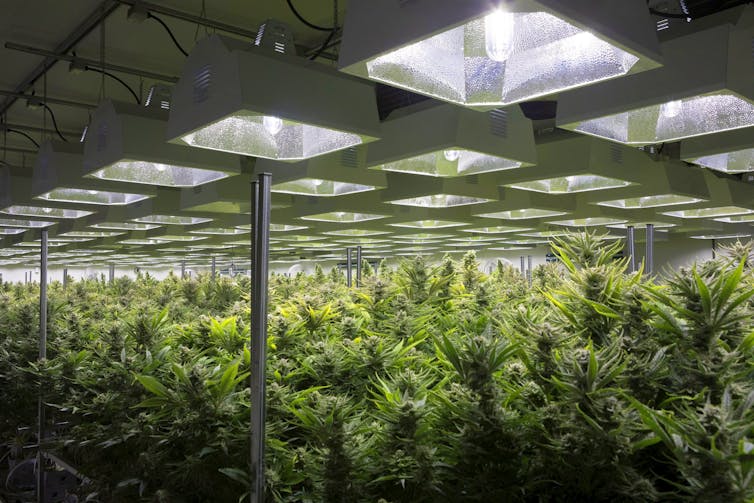
Also, much of the evidence in this area comes from post-accident investigations, where the workers involved are tested for marijuana or other drugs following a workplace incident.
These kinds of cases tend to be more publicized, but rigorous research with control groups (i.e., those who did not have an accident) is needed to understand whether there are more accidents among those using marijuana compared to those who are not.
And even though workers may test positive for tetrahydrocannabinol (THC) in their urine, that doesn’t necessarily mean they were impaired at the time of the accident. Marijuana remains in the system for quite some time. So someone can use marijuana on Friday night and come into work on Monday no longer impaired, yet test positive for marijuana use.
There is no consensus as of yet on the levels of THC detected in fluids that indicate acute impairment.
Slower driving reaction times
Often, the findings of studies measuring the impact of marijuana on driving are extrapolated to work settings, to understand the potential hazards of marijuana on workplace safety. But even in the area of driving research, there is much still to be understood.
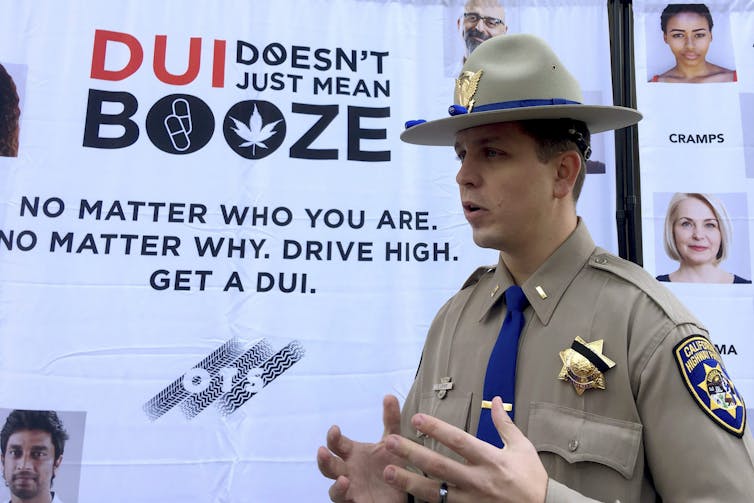
Researchers know marijuana use impairs driving, but it’s not yet clear how it does so. What is consistent among the studies published is that reaction time is slower, so people also drive slower.
Also, it isn’t clear to what extent you can extrapolate driving-to-work situations. Driving is a learned activity that many people do almost on auto pilot. Drivers’ brains are often multi-tasking; many people are talking or doing a secondary task while behind the wheel.
That kind of activity may be similar to some work situations, but not to others.
New research directions
We have very limited data on the extent of workplace cannabis use (e.g. during work, on breaks and in the hours prior to beginning a work shift) and impairment among workers in both the U.S. and Canada.
To address this gap, we have recently received funding from the Canadian Institutes of Health Research, along with Dr. Peter Smith, to conduct a survey of Canadian workers.
We will measure the current magnitude of cannabis consumption at work, reasons for workplace use, perceptions of its effects on work and availability in the workplace.
It will also be important to study the potential health impacts on workers involved in the production of cannabis. Some researchers in Washington State are beginning to look at this,with an initial focus on the effects of UV radiation.
Finally, one of the key avenues for future research will be to identify an accurate measure of impairment for use in workplaces. This is something that the workplace community is particularly keen to see.
An earlier Q & A version of this story was previously published in At Work.
Author: Andrea Furlan: Associate Professor of Medicine, University of Toronto and Nancy Carnide: Post-Doctoral Fellow, Institute for Work & Health, University of Toronto
Credit link: https://theconversation.com/marijuana-in-the-workplace-what-is-unsafe-89142<img src="https://counter.theconversation.com/content/89142/count.gif?distributor=republish-lightbox-advanced" alt="The Conversation" width="1" height="1" />
DONALD TRUMP SEND ANOTHER MESSAGE TO AFRICAN LEADERS AFTER SHITHOLE COMMENT
Friday, 26 January 2018 22:18 Written by oasesnewsUS President Donald Trump on Friday asked the African Union chairman to pass on his “warmest regards” to other regional leaders at a summit this weekend, after sparking outrage with a reported slur against Africans.
The outspoken US leader congratulated Rwandan President Paul Kagame on taking over as chair of the African bloc, which Trump said was a “great honour”.
“I know you’re going to your first meeting shortly. Please give my warmest regards,” Trump told Kagame after they held a one-on-one meeting at the World Economic Forum in Davos, Switzerland.
The reported remark drew outrage around the world and prompted several African governments to demand explanations from their US ambassadors.
The 55-nation African Union chaired by Kagame demanded an apology, although Trump has denied making the remark as relayed by US lawmakers who were present at the meeting.
Trump said he had “tremendous discussions” in Davos with Kagame, who for his part said they had “good discussions” about the economy and trade.
Source: ( AFP )
Facebook admits social media threat to democracy
Wednesday, 24 January 2018 17:55 Written by channelnewsasiaWASHINGTON: Facebook acknowledged on Monday (Jan 22) that the explosion of social media poses a potential threat to democracy, pledging to tackle the problem head-on and turn its powerful platform into a force for "good."
The comments from the world's biggest social network were its latest response to intense criticism for failing to stop the spread of misinformation among its two billion users - most strikingly leading up to the 2016 US election.
In a blog post, Facebook civic engagement chief Samidh Chakrabarti said he was "not blind to the damage that the internet can do to even a well-functioning democracy."
"In 2016, we at Facebook were far too slow to recognise how bad actors were abusing our platform," he said. "We're working diligently to neutralise these risks now."
The post - one in a series dubbed "hard questions" - was part of a high-profile push by Facebook to reboot its image, including with the announcement last week that it would let users "rank" the trustworthiness of news sources to help stem the flow of false news.
"We're as determined as ever to fight the negative influences and ensure that our platform is unquestionably a source for democratic good," said Katie Harbath, Facebook's head of global politics and government outreach, in an accompanying statement.
The social network has concluded that Russian actors created 80,000 posts that reached around 126 million people in the United States over a two-year period.
"It's abhorrent to us that a nation-state used our platform to wage a cyberwar intended to divide society," Chakrabarti said.
"This was a new kind of threat that we couldn't easily predict, but we should have done better. Now we're making up for lost time," he said.
Chakrabarti pointed at Facebook's pledge last year to identify the backers of political advertisements - while also stressing the need to tread carefully, citing the example of rights activists who could be endangered if they are publicly identified on social media.
He also elaborated on the decision to let Facebook's users rank the "trustworthiness" of news sources, saying: "We don't want to be the arbiters of truth, nor do we imagine this is a role the world would want for us."
While acknowledging concerns over the rise of "echo chambers," he argued that "the best deterrent will ultimately be a discerning public."
'WHAT COULD POSSIBLY GO WRONG?'
Facebook's plan to rank news organisations based on user "trust" surveys has drawn a mixed response.
Renee DiResta of the nonprofit group Data for Democracy was optimistic.
"This is great news and a long time coming. Google has been ranking for quality for a long time, it's a bit baffling how long it took for social networks to get there," she wrote on Twitter.
But technology columnist Shelly Palmer warned that Facebook appeared to be equating trust and truth with what the public believes - what some call "wikiality."
"Wikiality is Facebook's answer to fake news, alternative facts, and truthiness," Palmer wrote. "Facebook, the social media giant, is going to let you rank the news you think is most valuable. What could possibly go wrong?"
For media writer Matthew Ingram, the changes "not only won't fix the problem of 'fake news,' but could actually make it worse instead of better."
"Why? Because misinformation is almost always more interesting than the truth," he wrote in the Columbia Journalism Review.
News Corp founder and executive chairman Rupert Murdoch also expressed skepticism, suggesting Facebook should instead pay "carriage feeds" to trusted news organisations, following the example of cable TV operators.
"I have no doubt that Mark Zuckerberg is a sincere person, but there is still a serious lack of transparency that should concern publishers and those wary of political bias at these powerful platforms," Murdoch said in a statement issued by his group, which publishes the Wall Street Journal and newspapers in Britain and Australia.
Source: AFP/de/zl
Read more at https://www.channelnewsasia.com/news/technology/facebook-admits-social-media-threat-to-democracy-9886118
A year later: The mosque massacre & rising Islamophobia
Tuesday, 23 January 2018 23:24 Written by theconversationOn Jan. 29, 2017, a man entered a Québec mosque during evening prayer and opened fire on the backs of 53 congregants. Six died immediately.
A funeral service was held at a Montréal hockey arena for three of the victims. Prime Minister Justin Trudeau, Québec Premier Phillippe Couillard and other dignitaries delivered heartfelt speeches. They affirmed that an injustice towards Canadian Muslims is an injustice towards all Canadians. Muslims are Canadians and their pain is our pain, the politicians exclaimed.
“Vive le Québec! We love Canada!” the stadium replied.
One year later, it’s time to look back at the funeral and listen carefully to what was said. Why affirm the Canadian-ness (and Québecois-ness) of grieving Muslims?
It couldn’t possibly be to discourage the public from Islamophobia. That would be like declaring “Don’t be racist” — futile.
Rather, their declarations were directed at Muslims across the country: Don’t let this brutal act persuade you into thinking you don’t belong. The views of the accused killer, and others like him, are wrong. Muslims do belong to Canada and Québec.
Ultimate expression of Islamaphobia
Imagine public attitude towards Muslims on a continuum, however. On one end, we find the mass murder, the ultimate expression of anti-Muslim sentiment. On the other, we find the loving embrace of Muslims as our own, like a family welcoming an adopted child.
When growing anti-Muslim sentiment —no thanks to politics — resulted in a massacre, the political good will at the funeral accomplished one thing: It reminded Muslims that they do, in fact, belong to Québec. Their speeches therefore never escaped the continuum’s trajectory.
Rather, political declarations of solidarity — well-intended as they may be — remained fixed on what American scholar Anne Norton calls “the Muslim question,” a reference to Karl Marx’s On The Jewish Question.
“The Muslim question” defines the political centricity of Muslims as the archetypal threat to democratic nation-states. It’s the thematic summation of all moral panic surrounding Islam and Muslims, from civic integration to the war on terror. In short, the Muslim question is the inevitable “othering” of Muslims as foreign entities within the national body.
The politicians did not unpack the Muslim question at the funeral; they did not bring to our attention the unremitting oscillation between “good/accepted” and “bad/rejected” Muslims on the aforementioned continuum.
They simply positioned themselves favourably along its path. In doing so, the politicians legitimized the continuum’s raison d'être: The moral panic surrounding Islam and Muslims.
Moral panic
Their statements catered to the tacit anti-Muslim attitudes endemic in society, where Muslims are perceived as integration-resistant and threatening. They might as well have exclaimed: And as to the eternal question of whether Muslims belong in this country, Muslims are Canadians!
It should come as no surprise, then, that the niqab reappeared in the political limelight with Bill 62, Québec’s Religious Neutrality law.
The sentiments shared at the funeral remain relevant as the niqab is hoisted, once again, as the symbol of religious defiance of secular sanctity.
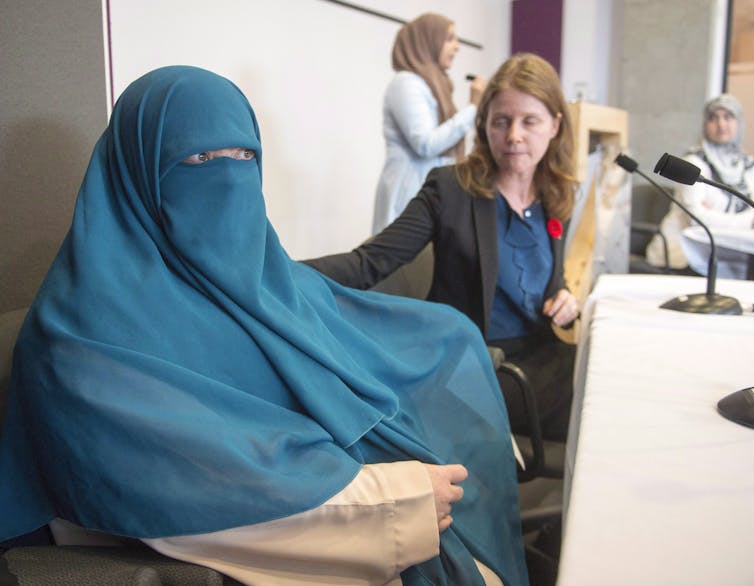
Our inability to question why Muslims have come to represent the “other” shows how little we are able to manoeuvre in our discussion. Bill 62 is the perfect example of this. The sensationalizing of a societal non-issue — niqab-wearing women who number perhaps no more than a few hundred in Québec — took centre stage only months after we’d buried the victims of the mosque massacre.
Political gestures of solidarity are comforting, but they remain fixed within the parameters of the Muslim question.
The root causes of why we’re asking the Muslim question run deep within the fabric of a society interlaced with financial, political and existential insecurities. And politicians continue to campaign on platforms that pander to the Muslim question — because it works.
The moral panic is real; it elected Trump.
Moving forward, if we are to make any progress, Canada and other countries must tackle the issues underlying the perception of Muslims in public consciousness.
Directly combating discrimination has proven to be insufficient. We cannot allow Muslim representation to oscillate incessantly. We cannot persist with the irony of proclaiming: “Don’t hate Muslims … but the niqab poses a national concern.”
Not an outlier
The accused killer was not a racist outlier. Racists are the product of the Muslim question somewhere along the end of the continuum where all Muslims are unequivocally bad/rejected .
What have we learned from the Québec City shooting a year ago? Very little, it seems. At the time of this writing, Québec political parties have refused to acknowledge Jan. 29 as a National Day of Remembrance and Action on Islamophobia.
The Coalition Avenir Québec (CAQ) says “[the shooting] is the intolerable act of a single person and not that of an entire society. Québecers are open and welcoming, they are not Islamophobic.” And yet Québec City anti-Muslim hate crime doubled in 2017.
The 29th of January should serve as a reminder then that we are — to this day — still trapped in the Muslim question’s awful continuum.
Author:Tarek Younis Newton International Postdoctoral Fellow, UCL Division of Psychiatry, UCL
Credit link: https://theconversation.com/a-year-later-the-mosque-massacre-and-rising-islamophobia-90007<img src="https://counter.theconversation.com/content/90007/count.gif?distributor=republish-lightbox-advanced" alt="The Conversation" width="1" height="1" />






